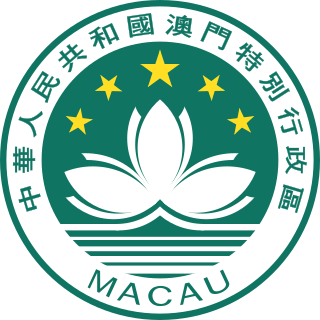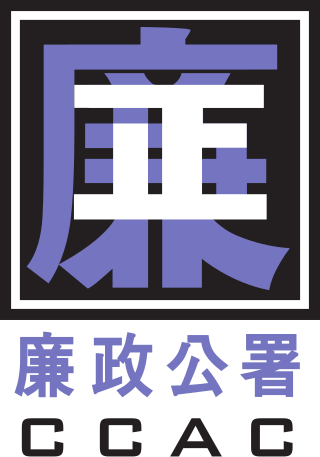Politics of Macau is a framework of a politically constrained multi-party presidential system, dominated by the People's Republic of China. It includes the legislature, the judiciary, the government, and a multi-party system. Executive power is exercised by the government, led by the Chief Executive.

Politics in Portugal operates as a unitary multi-party semi-presidential representative democratic republic, whereby the Prime Minister of Portugal is the head of government, and the President of Portugal is the non-executive head of state which, although it is a somewhat ceremonial figure, has some significant political powers they exercise often. Executive power is exercised by the Government, whose leader is the prime minister. Legislative power is primarily vested in the Assembly of the Republic, although the government is also able to legislate on certain matters. The Judiciary of Portugal is independent of the executive and the legislature. The President exerts a sort of "moderating power", not easily classified into any of the traditional three branches of government.

The Assembly of the Republic, commonly referred to as simply Parliament, is the unicameral parliament of Portugal. According to the Constitution of Portugal, the parliament "is the representative assembly of all Portuguese citizens". The constitution names the assembly as one of the country's organs of supreme authority.
Macau elects at the regional level its head of government and legislature. The Legislative Assembly is made up of 33 members, of whom 14 are elected by popular vote under proportional representation, 12 elected from functional constituencies and 7 appointed by the Chief Executive. The Chief Executive of Macau is returned by a 400-member Election Committee on five-year intervals.

The Legislative Assembly of the Macau Special Administrative Region is the organ of the legislative branch of Macau. It is a 33-member body comprising 14 directly elected members, 12 indirectly elected members representing functional constituencies and 7 members appointed by the chief executive. It is located at Sé.

The Commission Against Corruption is the statutory independent anti-corruption body of Macau with the primary objective of combating corruption, bribery, and other illicit activities in both the public and private sectors. Established in 1999 under the Article 59 of the Macau Basic Law, the CCAC is headed by the Commissioner, who reports directly to the Chief Executive of Macau.
The General Union for the Good of Macau was a political party-like civic group in Macau. In the 2005 legislative election, the group won 6.8% of the popular vote and 1 out of 12 popular elected seats. The group had already cancelled the registration with the authorities.

The two Autonomous Regions of Portugal from 1999 are the Azores and Madeira. Together with Continental Portugal, they form the Portuguese Republic.
The Democratic Movement is a centre to centre-right political party in France, whose main ideological trends are liberalism and Christian democracy, and that is characterised by a strong pro-Europeanist stance. MoDem was established by François Bayrou to succeed the Union for French Democracy (UDF) and contest the 2007 legislative election, after his strong showing in the 2007 presidential election. Initially named the Democratic Party, the party was renamed "Democratic Movement", because there was already a small Democratic Party in France.
Legislative elections were held in Macau on 20 September 2009. The official campaign began on 5 September, and several candidates received warnings from the Electoral Affairs Commission for having begun campaign activities beforehand.
Legislative elections were held in Macau on 15 September 2013 according to the provisions of the Basic Law of Macau. This election was the first of its kind succeeding the reform of the Legislative Assembly that created four new seats; two new geographical constituency seats and two new functional constituency seats. Out of a total of 33 seats, 14 were elected by universal suffrage under the highest averages method, while 12 were voted on from the Functional constituency, and 7 from nomination by the Chief Executive.

José Maria Pereira CoutinhoComM is a Macanese politician and jurist. He has been the Counselor of the Portuguese Communities since 2003, President of Macau Civil Servants Association since 1998, and President of pro-democracy party New Hope and Deputy of the Legislative Assembly of Macau since 2005.
Legislative elections were held in Macau on 12 September 2021. This legislative election will return 33 members of the Legislative Assembly of Macau, with 14 directly elected by all electorates, 12 indirectly elected by special interest groups and 7 appointed by the Chief Executive 15 days after the announcement of the election results.
Chief Executive elections were held in Macau on 15 May 1999 to elect the first Chief Executive (CE), the highest office of the Macau Special Administrative Region, before Macau was due to be handed back to China by Portugal. Edmund Ho was elected as the first leader of the Macau SAR. This was the only contested Chief Executive election to date.
Macao Civic Power, or in short Civic Power, is a centrist political party in Macau.
Legislative elections were held in Portuguese Macau on 9 October 1988, returning 17 members of the Legislative Assembly of Macau, with six directly elected by electorates, six indirectly elected by special interest groups and five appointed by the Governor.
Legislative elections were held in Portuguese Macau on 15 August 1984. There were 17 members of the Legislative Assembly of Macau up for election: six directly elected by electorates, six indirectly elected by special interest groups and five appointed by the Governor of Macau.
Legislative elections were held in Portuguese Macau on 11 July 1976, returning 17 members of the Legislative Assembly of Macau, with 6 directly elected by electorates, 6 indirectly elected by special interest groups and 5 appointed by the Governor.

Democratic Centre of Macau is a centre-left progressive Portuguese political association based in Macau, then a Portuguese colony. Founded on 30 April 1974, five days after the Carnation Revolution, it remains the only registered political association in Macau, different from the better-known civic associations.
Association for the Defense of Macau Interests was a Portuguese conservative and localist political association based in Macau. Founded on 19 June 1974 by Delfino José Rodrigues Ribeiro and Carlos Augusto Corrêa Paes d’Assumpção, ADIM collaborated politically with CDS in Portugal, as both shared similar ideology






